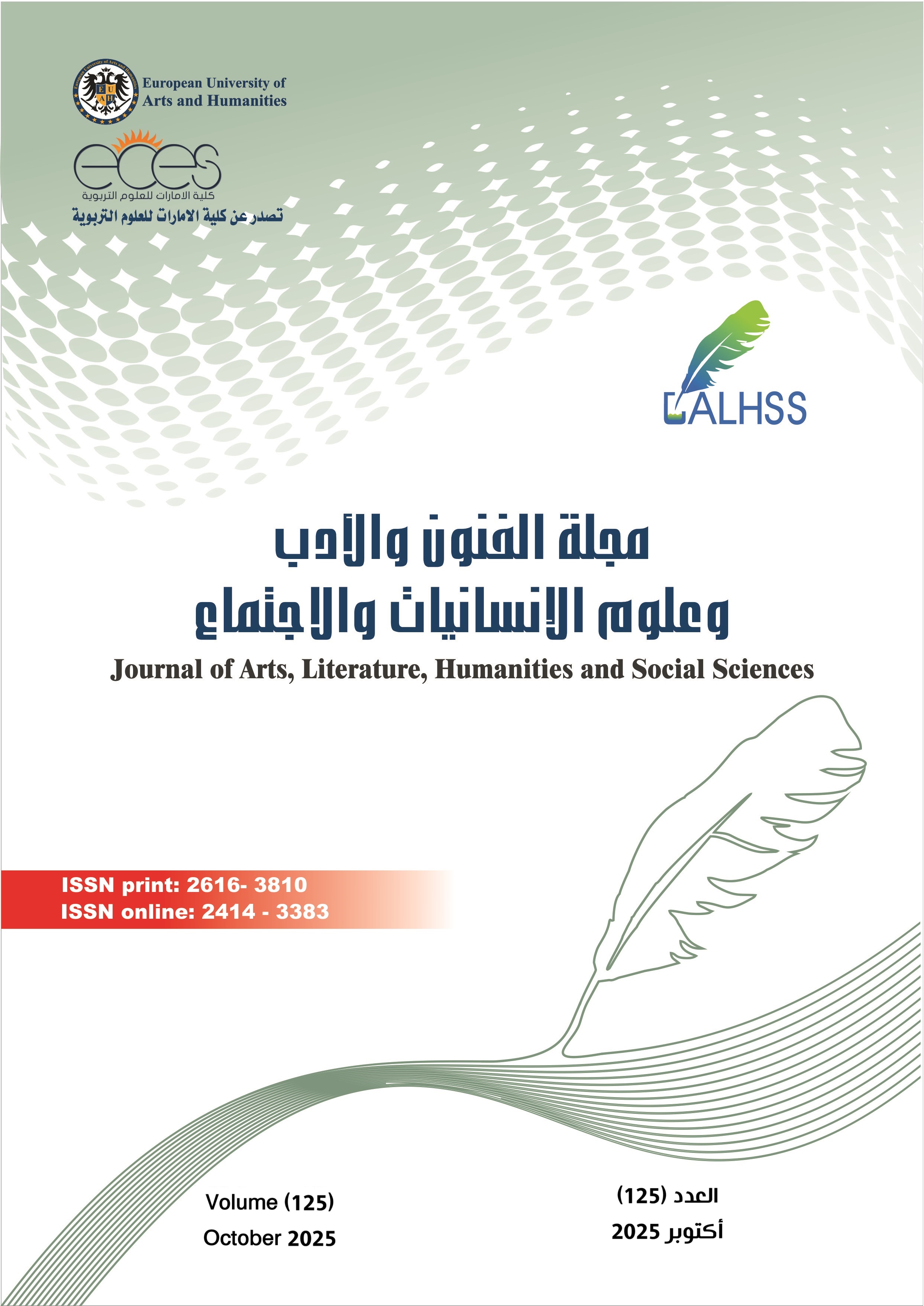الإسهام النسبي لإدمان وسائل التواصل الاجتماعي في التنبؤ بالتشوهات المعرفية
الملخص
هدفت الدراسة الحالية إلى استقصاء مستوى إدمان وسائل التواصل الاجتماعي والتشوهات المعرفية لدى طلاب المرحلة الجامعية، والكشف عن الفروق المحتملة تبعًا لمتغير النوع (ذكر/أنثى)، إضافة إلى فحص العلاقة بين هذين المتغيرين وتحديد مدى قدرة إدمان وسائل التواصل الاجتماعي على التنبؤ بالتشوهات المعرفية. تم تطبيق مقياسين مقننين لقياس الإدمان على وسائل التواصل الاجتماعي والتشوهات المعرفية على عينة مكونة من (161) طالبًا وطالبة من طلاب الجامعة. وأظهرت النتائج أن مستوى إدمان وسائل التواصل الاجتماعي لدى أفراد العينة جاء ضمن المستوى المتوسط، وهو ما يشير إلى أن الاستخدام متكرر ومرتبط بمتطلبات الحياة اليومية، إلا أنه لا يصل في مجمله إلى مستويات مرتفعة من الاعتماد أو السلوك الإدماني. في المقابل، أظهرت النتائج أن التشوهات المعرفية ظهرت بمستوى مرتفع نسبيًا، مما يعكس انتشار أنماط معرفية غير تكيفية مثل التفكير الكارثي، والتعميم المفرط، والتجريد الانتقائي بين طلاب وطالبات الجامعة. كما بينت التحليلات الإحصائية عدم وجود فروق ذات دلالة إحصائية بين الذكور والإناث في كلا من مستوى ادمان وسائل التواصل الاجتماعي والتشوهات المعرفية، الأمر الذي يشير إلى أن الجنس لم يكن محددًا مؤثرًا في هذه الظواهر. وأكدت النتائج وجود علاقة ارتباطية قوية ودالة بين إدمان وسائل التواصل الاجتماعي والتشوهات المعرفية، كما أظهرت قدرة تنبؤية واضحة لإدمان وسائل التواصل الاجتماعي في تفسير الارتفاع في مستويات التشوهات المعرفية. النتائج من هذه الدراسة تشير إلى أهمية فهم البعد المعرفي المرتبط بالاستخدام المفرط لوسائل التواصل الاجتماعي، حيث يمكن أن تسهم هذه الظاهرة في تشكيل أنماط تفكير غير صحية لدى الشباب الجامعي. ومن ثم، تبرز الحاجة إلى تدخلات إرشادية وبرامج توعوية تعمل على تعزيز الوعي بالآثار النفسية والمعرفية للاستخدام المفرط، وتزويد الطلبة باستراتيجيات بديلة أكثر تكيفًا لإدارة الضغوط والأنشطة اليومية.
المراجع
2. Aldea, M. A., & Rice, K. G. (2006). The role of cognitive distortions in the relation between perfectionism and psychological distress. Journal of Counseling Psychology, 53(4), 498–510. https://doi.org/10.1037/0022-0167.53.4.498
3. Andreassen, C. S. (2015). Online social network site addiction: A comprehensive review. Current Addiction Reports, 2(2), 175–184. https://doi.org/10.1007/s40429-015-0056-9
4. Andreassen, C. S., Pallesen, S., & Griffiths, M. D. (2017). The relationship between addictive use of social media, narcissism, and self-esteem: Findings from a large national survey. Addictive Behaviors, 64, 287–293. https://doi.org/10.1016/j.addbeh.2016.03.006
5. Argyroudi, A., & Darviri, C. (2013). Cognitive distortions, stress and depression in university students. Hellenic Journal of Psychology, 10(2), 132–149.
6. Bányai, F., Zsila, Á., Király, O., Maraz, A., Elekes, Z., Griffiths, M. D., ... & Demetrovics, Z. (2017). Problematic social media use: Results from a large-scale nationally representative adolescent sample. PLoS ONE, 12(1), e0169839. https://doi.org/10.1371/journal.pone.0169839
7. Beck, A. T. (1976). Cognitive therapy and the emotional disorders. New York: International Universities Press.
8. Beck, A. T., Steer, R. A., & Brown, G. K. (1996). Manual for the Beck Depression Inventory-II. San Antonio, TX: The Psychological Corporation.
9. Beck, J. S. (2011). Cognitive behavior therapy: Basics and beyond (2nd ed.). New York, NY: Guilford Press.
10. Buysse, D. J., Reynolds, C. F., Monk, T. H., Berman, S. R., & Kupfer, D. J. (1989). The Pittsburgh Sleep Quality Index (PSQI): A new instrument for psychiatric research and practice. Psychiatry Research, 28(2), 193-213.
11. Caplan, S. E. (2007). Relations among loneliness, social anxiety, and problematic Internet use. CyberPsychology & Behavior, 10(2), 234–242
12. Çelik, Ç. B., & Odacı, H. (2013). The relationship between problematic Internet use and interpersonal cognitive distortions and life satisfaction in university students. Children and Youth Services Review, 35(3), 505–508. https://doi.org/10.1016/j.childyouth.2013.01.001
13. Ellis, A. (1962). Reason and emotion in psychotherapy. New York: Lyle Stuart.
14. Griffiths, M. D. (2012). Facebook addiction: Concerns, criticism and recommendations. Psychological Reports, 110(2), 518–520.
15. Hammen, C. (2005). Stress and depression. Annual Review of Clinical Psychology, 1, 293–319.
16. Hawi, N. S., & Samaha, M. (2016). The relations among social media addiction, self-esteem, and life satisfaction in university students. Social Science Computer Review, 35(5), 576–586. https://doi.org/10.1177/0894439316660340
17. Kalkan, M. (2012). The relationship between cognitive distortions and Internet addiction in Turkish adolescents. Children and Youth Services Review, 34(10), 2087–2090. https://doi.org/10.1016/j.childyouth.2012.07.010
18. Kuss, D. J., & Griffiths, M. D. (2011). Online social networking and addiction: A review of the psychological literature. International Journal of Environmental Research and Public Health, 8(9), 3528–3552. https://doi.org/10.3390/ijerph8093528
19. Kuss, D. J., & Griffiths, M. D. (2017). Social networking sites and addiction: Ten lessons learned. International Journal of Environmental Research and Public Health, 14(3), 311.
20. Kuzuçu, Y., & Şimşek, Ö. F. (2020). The role of cognitive distortions in interpersonal relationships: A study on university students. International Journal of Psychology and Educational Studies, 7(2), 45–60
21. Özparlak, A., & Karakaya, D. (2022). The associations of cognitive distortions with Internet addiction and Internet activities in adolescents: A cross-sectional study. Journal of Child and Adolescent Psychiatric Nursing, 35(3), 165–174.
22. Şimşek, Ö. F. (2021). Cognitive distortions as predictors of social anxiety and depression in university students. Journal of Cognitive and Behavioral Psychotherapy, 21(3), 215–230.
23. حمري ص., & مزغراني ح. (2020). إدمان مواقع التواصل الاجتماعي وعلاقته بالتوافق الشخصي والأسري لدى الطالب الجامعي. مجلة الجامع في الدراسات النفسية والعلوم التربوية, 5(2), 605-632. https://asjp.cerist.dz/en/article/139188
24. الخفيفي، ابتسام. (2024). التشوهات المعرفية بوصفها منبئًا بالسلوك العدواني لدى المراهقين في بنغازي. مجلة كلية التربية العلمية، 14(2)، 55–74.
25. سهر نجيب عبدو علي. (2023). وسائل التواصل الاجتماعي وأبعادها التفاعلية على الشباب في محافظة عدن. المجلة الإلكترونية لجامعة عدن للعلوم الإنسانية والاجتماعية، 7(3)، 101–120.
26. صلاح الدين، لمياء عبدالرازق. (2015). مقياس التشوهات المعرفية للشباب الجامعي. مجلة الإرشاد النفسي، ع41 ، 651688 - 682.
27. الغامدي، صالح بن يحيى. (2022). وسائل التواصل الاجتماعي وعلاقتها بكل من الأعراض الاكتئابية وجودة النوم لدى طلبة جامعة الملك عبد العزيز. مجلة العلوم التربوية، 31(1)، 277–334. مسترجع من http://search.mandumah.com/Record/1308831
28. الغامدي، ع. (2020). التشوهات المعرفية وعلاقتها بالتوافق الأكاديمي والاجتماعي لدى طلاب الجامعة. مجلة جامعة الملك سعود للعلوم التربوية، 32(1)، 77–95.
29. لامية طالة. (2023). شبكات التواصل الاجتماعي والإدمان الإلكتروني: مقاربة نفسية اجتماعية. مجلة المعيار، 15(1)، 44–63.
30. مدكور، ع.، وكريري، ف. (2021). التشوهات المعرفية وعلاقتها بإدمان الإنترنت لدى طلاب الجامعة. مجلة العلوم التربوية والنفسية، 5(6)، 33–50.
الحقوق الفكرية (c) 2025 د. زينب محمد عوض اليوبي

هذا العمل مرخص حسب الرخصة Creative Commons Attribution-ShareAlike 4.0 International License.



